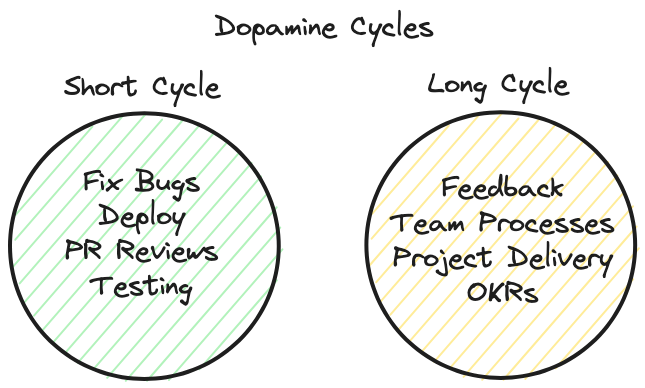Most engineering managers transition from an individual contributor role. A significant difference in this change is the frequency of dopamine hits. At first, it may not seem relevant, but this is one of the main reasons why some managers transition back to being software engineers.
First, let’s define the concept of dopamine in this context. Dopamine is a chemical substance that transmits signals to your brain and gives the sensation of pleasure, reward and gratification.

As engineers, we constantly get dopamine due to the work’s nature. For example, when we merge a PR, deliver a feature, fix a test, or debug an issue. Each of these moments contributes to regular dopamine hits. Having that feeling of “Yeah, it works!” is something that engineers love and drives them to keep coding and solving problems. However, as a manager, the dopamine cycle is longer due to the different characteristics of the role, which can be a challenge for new managers. Transitioning from a role with a short to a long cycle of dopamine requires defining other sources of gratification to help keep the motivation and the excellence at work. This is one of the reasons why transitioning to a management role is not a promotion but a completely different job.

Engineers build systems that solve problems using binary code (0’s & 1’s). The feedback cycle is short since the computer can execute the instructions immediately and show the results. Although, as a manager, we are building systems for people and organisations where the feedback cycle is longer. For example, when giving constructive feedback to a direct report, it takes time for the person to act on it and see the improvements. Another example is changing the processes of how the team works to improve delivery performance. All these examples take weeks to see the actual outcome. But I can assure you it will be a big rush of dopamine seeing the positive impact on the people around you.
Does all this mean managers can only get dopamine once in a while? Not at all! We must reinvent and think differently about the concept of dopamine and what are the daily rewards of being a manager.
Completing Tasks
As I mentioned in my previous article, “Manage Yourself”, having a to-do list to track our tasks is crucial. Something that works for me is to plan my day first thing in the morning. Move all tasks you plan to complete today to a “Do Today” column and focus on that over the day. While moving the tasks to “Done”, you will get a small amount of dopamine, and by the end of the day, I bet you will get the “Yeah, I have smashed them all” feeling.
Team Progress
A great way of getting gratification in the morning is to look at the tasks board during the standup and see the team’s progress. Seeing the tickets moving to the “Done” column should give you a sense of fulfilment, meaning the system you built is working, and your team delivers effectively.
Measure your Impact
Measure your team performance impact by retrospecting the state transitions over time. Some managers are challenged to manage dysfunctional teams. These teams usually have inefficient processes, deliver poor quality and fail deadlines. These teams don’t change magically. They need external force (YOU). You should appreciate the system you built that helped the team transition to a high performant state and keep refining the system for continuous improvement.
Feedback
Ask for feedback during your 1:1s meetings with your direct reports. Getting feedback is an excellent way to understand if you are doing a good job and meeting the team’s expectations. If you get constructive feedback, you have something to work on to improve yourself, which is a positive outcome regarding personal and professional growth.
Engineering work
Being a manager does not mean you cannot be involved in the technical work. You should ensure technical excellence, which can be done by reviewing pull requests, contributing to architectural decisions and mentoring engineers. However, avoid taking mentorship opportunities from engineers or being a bottleneck for critical features to allow people to grow.
Metrics
Numbers and metrics drive some people. Analysing the product KPIs, operational metrics, or team delivery performance can give a sense of satisfaction when the results are positive. Conversely, if the results are not optimal, then it provides an opportunity to develop a plan for improvement and work towards achieving success.
In conclusion, different roles have different ways of getting the dopamine rush that drives most people to keep doing their job. As a manager, we need to revisit the concept of dopamine and find different ways to get the reward from our work. It is also vital to understand that external factors beyond work impact dopamine releases, like lack of sleep, unhealthy habits, and stress. So ensuring you are physically and mentally healthy will contribute to more dopamine at work and in your personal life.